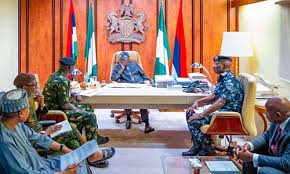
First anniversary: Tinubu govt awards N6tn contracts for roads, others
The Federal Executive Council, led by President Bola Tinubu, has given 51 contracts totaling N6.27 trillion to acquire, build, and develop major infrastructure projects throughout the federation in eight months.
The contracts, which were awarded for a period of eight months, from October 16, 2023, to May 14, 2024, were given to support the development of a broad range of infrastructure projects in vital industries, including the building of roads, bridges, train systems, and airport facilities.
Among other things, it awarded contracts for three airports and 43 road projects.
At the top of the Federal Government hierarchy is the Federal Executive Committee (FEC). It is made up of ministers and other senior cabinet members, and it is mandated by the constitution to create policies, carry out initiatives, and generally support the President in carrying out his executive duties, although the president is the ultimate executive decision-maker.
The President, in his inaugural speech on May 29 last year, promised massive development of infrastructure.
"We shall continue the Buhari administration's infrastructure efforts," he declared. The development of national rail, road, and port networks will get top emphasis.
Tinubu gave his cabinet colleagues a challenge to work hard and be dedicated to building a thriving economy that will benefit every Nigerian during the FEC's inaugural meeting in August of last year.
Ministers were among the FEC members that Tinubu urged to put in a lot of effort, stating that Nigerians had very high standards and that poor work would not be accepted.
The President also repeated the policy objective of his administration, which calls for strengthening national security for peace and prosperity as well as restructuring the economy to provide inclusive and sustainable growth.
"We both understand that these are difficult times and that expectations are high. To build a thriving economy that would benefit Nigeria, we need to put in a lot of effort and get moving. Our jobless rate is intolerable, and climate change is posing a threat to us.
You have been chosen to give it your all in order to make things better. By implementing our policies, we will assure inclusive growth, reform the economy, and bolster security to promote peace and prosperity. Investments cannot occur in the absence of security, the president declared.
Additionally, he gave his approval for the weekly FEC meeting to be held on Mondays. The Federal Election Commission (FEC) met weekly on Wednesdays under the previous administration.
Route Abuja-Lokoja
A breakdown of the projects revealed that the Ministry of Works obtained N89 billion in permission for the repair of Koton-Karfe-Abaji road (Abuja 12-bound), which runs through Kogi state and connects Abuja and Lokja. This sanction was obtained during the FEC meeting on May 14.
On the same day, the FEC also granted a contract for N120 billion for the dualized Auchi stretch of the Lokoja-Benin road, as well as the equalisation of the Okpela stretch. BUA Cement will finance the road through the tax credit programme.
This decision was made on May 14th, at a long meeting that Tinubu chaired and during which 21 important policy proposals were announced.
On the same day, N1.6 trillion was awarded for section two of the Lagos-Calabar coastal highway, with N546 billion allocated for roads and bridges in Kaima- Tesse, Kwara State, Benin-Agbor, Benin Byepass and Ngaski-Wara in Kebbi State and N230bn Construction of a 37-kilometre Kano Bypass road.
The Federal Government authorised N1.067tn for the highway's initial construction phase on February 26. The segment, a 47.47-kilometer dual carriageway with five lanes on each side and a train track in the middle, is a part of a 700-kilometer road that spans nine states and has two spurs that go up north, according to Minister of Works David Umahi.
Hitech Construction Company Limited was given the go-ahead to build the 700-kilometer Lagos-Calabar coastal highway under an engineering, procurement, construction, and financing structure in which the contractor bears the majority of the risk. The project would cross nine states.
According to Umahi, the FEC authorised contracts worth N1.495 trillion for 29 roads and bridges nationwide on March 26.
Umahi clarified, saying, "The Federal Executive Council took into consideration and approved 29 roads and bridges totalling N1.5tn. After going through the Bureau of Public Procurement, they were all approved by FEC, and we got Certification of No Objection.
Benue projects
The Bukuru bridge in Benue State that spans the Katsina-Ala River was also approved by the council. It is a twin bridge that is roughly 850 metres long, matching the dualized road there. All told, it is 1.7 kilometres long and costs roughly N83.799 billion.
A route in Oyo State that connects Shaki and Okerete was also approved by the FEC. The 91.432 km road would set you back N144 billion.
Seven road projects totaling N992.23 billion were given contracts in March for their construction and renovation.
Additionally, the FEC approved N5.5 billion to finance the building of access roads to serve the communities along the proposed Abuja light rail project.
At the Murtala Muhammed Airport in Lagos State, N4.2 billion was granted for the procurement, setup, and instruction of operators for disabled aircraft recovery devices.
The FEC approved N6.33 billion on December 13, 2023, for the purchase of a broad area multilateration air traffic management system at the Port Harcourt International Airport in Omagwa, Rivers State, and technical support services at the Murtala Muhammed International Airport in Lagos.
Festus Keyamo, the Minister of Aviation and Aerospace Development, said that the China Civil Engineering Construction Corporation Ltd. would handle the five-year, N4.1 billion technical support service, which entails maintaining the new international wing of the Lagos Airport.
It would cost N2.23 billion to install the multilateration air traffic control system at the Port Harcourt International Airport.
"The contract is for N4.1 billion for the first five years, including 7.5 percent VAT, and has a completion period of five years. It is for the comfort of the travelling public, for Nigerians,” he added.
Other projects include the N51 billion construction of bus terminals and other transportation infrastructure in the Federal Capital Territory, the N7.6 billion renovation of Kwaita-Yebu 5 Road in the Kuala Area Council of Abuja, and the N37.2 billion construction of the Court of Appeal Abuja Division.
Financial experts praised the government's strategic move to give infrastructure projects top priority, describing it as a proactive and forward-thinking move meant to support economic growth, improve connectivity, and promote sustainable development across a range of industries, in an interview with our correspondent in Abuja.
Dr Muda Yusuf, the CEO of the Centre for the Promotion of Private Enterprise, stated that initiatives that were granted awards were valuable and had a big impact on development.
"The projects are valuable and worthwhile, with each one aimed at promoting development," he declared. You can only have as many projects as you have resources, and they are projects that help our nation develop. To make them a reality, the government needs to set aside sufficient funds. The quantity of resources available will dictate how many projects you can undertake, but from a development perspective, each project is valuable, and the government only needs to make sure it has the resources necessary to see it through to completion.
Similarly, Segun Ajibola, an economics professor at Babcock University, claimed that the government has been resourceful in obtaining contracts through private and public partnerships.
Ajibola declared, "In the last few months, this administration has been very inventive in the contracts it has awarded." There are a lot of projects that would be ideal, but financing may not always be available, and projects are now awarded in a variety of methods. For instance, a cooperation with Dangote allowed for the completion of the recently commissioned Oshodi-Apapa motorway, which will benefit the corporation through tax rebates. Additionally, a few of the initiatives rely on public-private partnerships and won't be funded by the government directly.
There are unfinished projects all over the place, and some, like the road projects, are cries for attention. We can only keep up our support for the administration and hope that the nation as a whole will increase the ante by increasing the revenue being mobilised. The environment is a serious infrastructural deficit and begging for serious attention.”
Charles Sanni, the CEO of Cowry Treasurers Limited, for his part, emphasised the value of maximising the benefits from these projects and the need to give longer-term projects a higher priority than ones that can be completed right away, particularly in light of the fact that there are other incomplete projects that need to be attended to.
Speaking about economic optimisation, Sanni stated, "Again, there are political issues in economic policies, so if you ask on the streets, I would say they may not be necessary." For the president, however, it is solely financial and economic, but it may be a reward for political favouritism. The government has an obligation to maximise the advantages of those initiatives. I don't believe starting those





